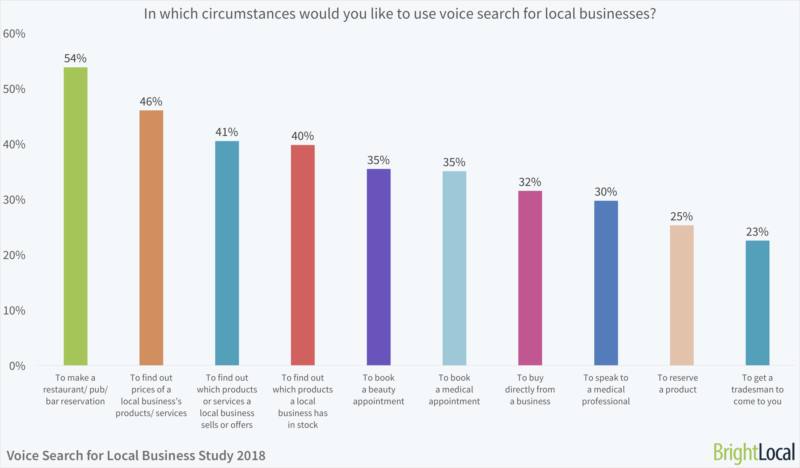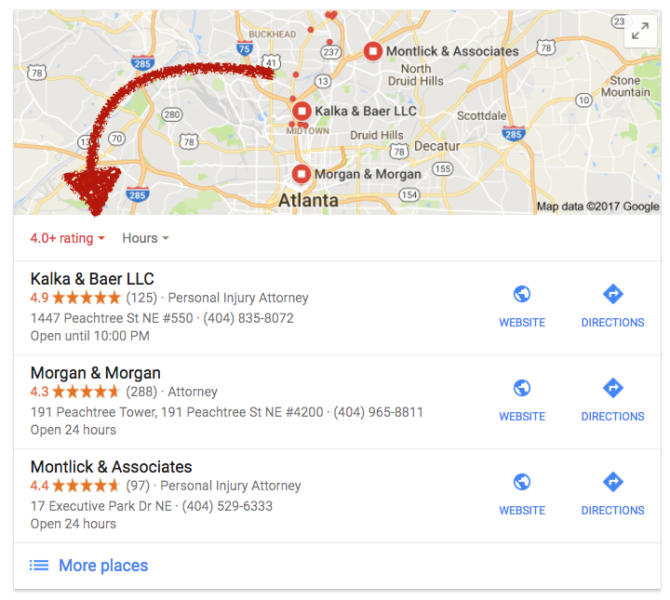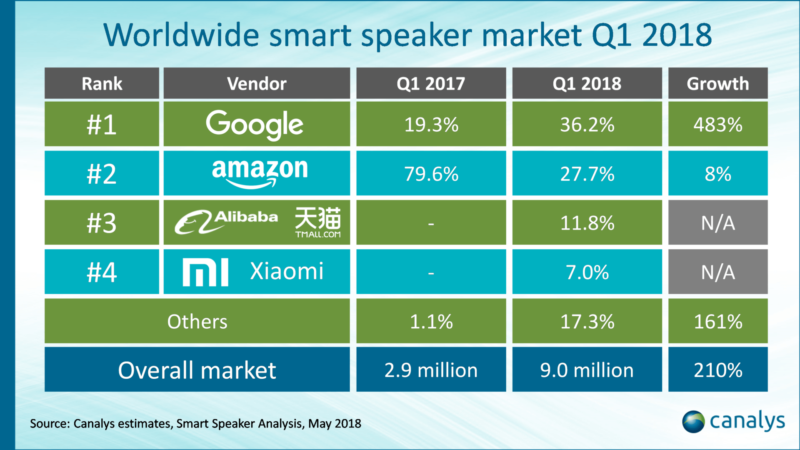It’s time for local business to take voice search seriously
Pokémon Go and fidget spinners are fads, but voice search for a local business is not, says contributor Jamie Pitman. With new technologies like Google Duplex coming on, local business owners should optimize for voice search.
 At this year’s Google I/O conference, Google CEO Sundar Pichai unveiled a brand-new voice assistant, Google Duplex, that introduces a new way to carry out “real-world” tasks over the phone, like booking a hair salon appointment or making reservations at a restaurant.
At this year’s Google I/O conference, Google CEO Sundar Pichai unveiled a brand-new voice assistant, Google Duplex, that introduces a new way to carry out “real-world” tasks over the phone, like booking a hair salon appointment or making reservations at a restaurant.
The ramifications of technologies like this are many, but what really interested me is the fact that this artificial intelligence (AI)-based phone system specifically focuses on interactions between local business and consumers.
Up until now, most discussions around Google voice search have been on gathering information rather than actually performing voice commands with a real-world effect.
The introduction of Google Duplex highlights for me one of the directions Google is headed, namely, the proliferation of tools, algorithms and functionalities designed to improve interactions with local businesses.
Whether the searcher is in the discovery, selection or conversion point of their journey, there will have been something that Google has introduced in the last year or so to make the process quicker and easier for the user (though admittedly at the expense of traffic to local business websites).
I’m going to provide some tips on how local businesses can prepare their websites and business operations for the voice search revolution, but first, let’s take a closer look at why it’s important to get serious about voice search.
Local business searches using voice search are up
My company, BrightLocal, recently performed research that shows that 75 percent of smart speaker owners perform searches for local businesses on a weekly basis, and an astonishing 53 percent say they perform these searches every day.
This frequency of voice search use for local businesses shows just how relevant this technology is to brick-and-mortar locations, but it’s worth noting that elsewhere in the research it’s clear that consumers are using voice search to get information on businesses they’re already aware of, rather than discovering new ones.
Attempting to peek into the voice crystal ball, our study also revealed the sorts of voice search interactions consumers would like to be able to make with local businesses if they could. (We didn’t know Google Duplex was in the works at the time.)
It’s particularly interesting to see how these tally up with Google Duplex’s proposed functionality. The 54 percent of respondents who want to be able to make restaurant reservations with voice search will be pleased that their needs will be catered to, but does Duplex’s future contain the ability to request stock and service information?
Good questions, I’ll be watching the release and development of Duplex carefully, and I look forward to finding out which of these interactions comes next.
So, with the above in mind, I’d like to break down what local businesses and their search engine optimization (SEO) teams can do to take advantage of the voice search revolution.
Create content for position zero and voice search
Google’s featured snippets (also known as answer boxes) have revolutionized the search experience, allowing Google to position itself between consumer and business website with ease. This is particularly true when it comes to voice search, as assistants answer queries with only the contents of the top, “Position Zero” search results.
Obviously, these positions are much sought-after and therefore heavily competitive, but for local businesses, they also present an opportunity to truly own a niche.
If you want your local business to appear in position 0, you should research and discover the kinds of low-intent questions users ask Google that doesn’t currently result in a feature snippet appearing and create website content that satisfies those specific questions.
To find these questions, perform keyword research as you normally would, but focus on questions relevant to your audience’s needs.
- List all the topics you can think of that are relevant to your business. (Don’t be afraid to go overboard with this list; there might be a gem of a question lurking in there!)
- Next, use a free tool like AnswerThePublic to discover the sorts of popular questions searchers ask about these topics.
- Enter every question into Google and note the questions not found in a featured snippet.
What do you do when there are no niche questions that don’t return a featured snippet? Well, it’s time to look at the content the snippets came from and create much better content on the same subject!
Many Google featured snippets are incomplete, not 100 percent accurate or relevant, and for some, the content isn’t structured in a way that the user would want. If you can create better content and include structured markup that makes it easier for Google to understand and present the content in the correct format, you stand a good chance of hitting that top spot and appearing in voice search results.
Boost your prominence
Since our research showed consumers use voice search for informational queries more than discovery queries, it’s important to do what you can to improve your business’s standing in the local search pack, as this is what Google’s voice assistant reads from when users ask it for local businesses.
You obviously can’t do anything about proximity, but you can influence the other two: relevance and prominence.
To boost relevance, make sure the content on your website is relevant to search queries you want to rank for. Google wants to see that you’re informing your target audience and not just trying to capture traffic from random queries that have nothing to do with you.
As for prominence, this is where reputation management and online reviews come into play. To improve your chances of getting into the three-pack and featured in voice search results, you need to ensure that people are talking about your business in a positive way. Where available, Google presents business’s average star ratings in their local pack links, so it goes without saying that reputation is a factor that affects local rankings.
However, it doesn’t end there. Other prominence signals that affect appearance in voice search results include mentions on social media, listings in local town directories and mentions in the local press. Anything you can do to bolster your reputation in your local community will inevitably have a positive impact on your local search rankings, and therefore will impact the likelihood of your business being featured in voice search results.
Get the tech
There’s no point investing time and effort into optimizing your site for a particular technology like voice search without getting your hands dirty and actually using the technology for yourself. You need to understand the consumer mindset before you can act to satisfy it.
It’s not just about downloading a voice assistant to your phone; smart speakers such as Amazon Echo and Google Home are experiencing growth:
It’s important to get the feel of the potential, and in some cases, limitations, contained within smart speakers.
Another key factor in your smart speaker purchase is how accurately voice search results using a smart speaker reflect standard manual searches.
In the industry’s first Voice Search Ranking Report compiled by digital agency Roast, it was revealed that 26 percent of search results that appear in answer boxes online don’t get read out by smart speakers for the same query. From The Drum:
If you’re optimizing your local business website for voice search, you need to use the tech yourself on a regular basis in order to get the real experience.
Prepare staff for Google Duplex
Although this isn’t strictly an online tactic, it’s certainly something that’s worth doing as the release of Duplex looms. Soon your staff, especially those that take bookings and appointments, will be fielding calls from impressively realistically voiced Google assistants, and the better prepared they are for it, the less likely they are to become irked at dealing with a robot.
For Google Duplex to work in the way it aims to, there needs to be education around what this assistant means for those picking up the phone. When you can, test out using Duplex to call your business and see how your staff respond. Train them on whatever limitations Duplex has and try to ensure they speak in a way that elicits the appropriate response.
Be realistic about voice search
Prominence in voice search is only going to ramp up in competition. In times like these, it’s important to be realistic and focus primarily on what works for you while keeping yourself informed and updated on search trends and technology. The best SEO professionals always keep one eye on future-proofing their websites and content.
Optimizing for voice search is a very steep mountain to climb, and it won’t work for or be needed for every local business. However, I hope I’ve shown above that consumers use voice search for local businesses a great deal, and this use is only going to increase as new technologies like Google Duplex are introduced.
Ultimately, if you or your local business clients have been shrugging off voice search as a fad, it’s time to start taking it seriously.
Contributing authors are invited to create content for Search Engine Land and are chosen for their expertise and contribution to the search community. Our contributors work under the oversight of the editorial staff and contributions are checked for quality and relevance to our readers. The opinions they express are their own.
Related stories
New on Search Engine Land




